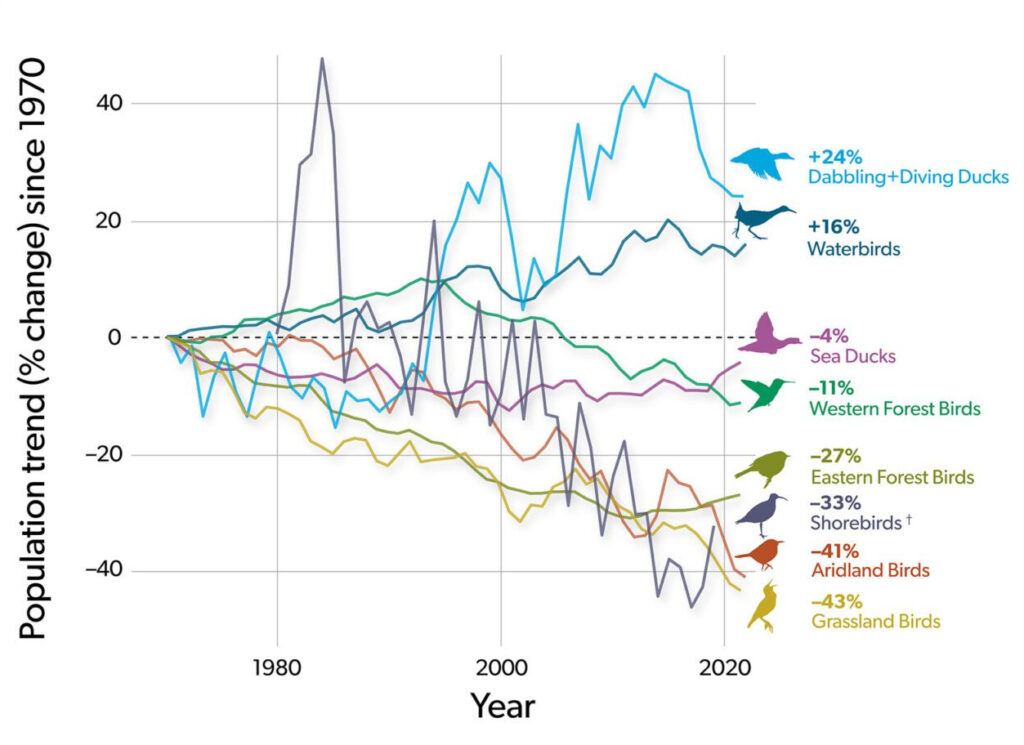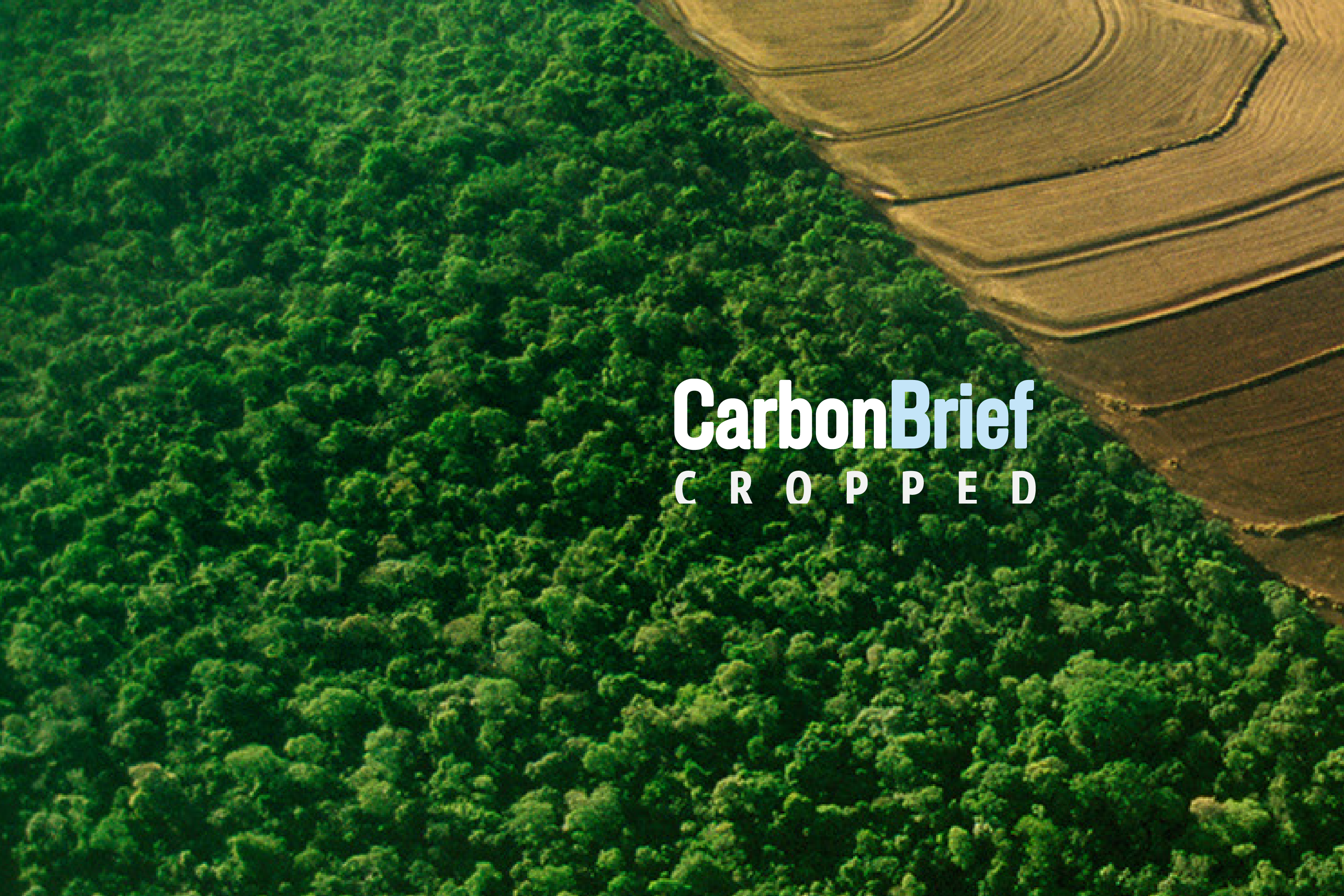We handpick and explain the most important stories at the intersection of climate, land, food and nature over the past fortnight.
This is an online version of Carbon Brief’s fortnightly Cropped email newsletter. Subscribe for free here.
Forest and biodiversity funds
TRANSFORMING FOREST FINANCE: A Forest Declaration Assessment report revealed that global forest finance is “not only falling short, but actively fuelling deforestation”, said Down to Earth. According to the report, for every dollar allocated to forest protection, six dollars go to activities driving deforestation. In 2023 alone, private financial institutions invested $6.1tn in sectors linked to deforestation, while governments spent $500bn in subsidies harmful to nature. Relatedly, several organisations launched a call to action for forest protection. It listed the priority actions for governments in 2025, which include enhancing ambition in forest goals, promoting deforestation-free trade, scaling up forest finance and securing land rights of forest communities.
NEW CONTRIBUTIONS: Brazil’s planned $125bn “Tropical Forests Forever Facility” is on track to be launched at COP30 this year, the Straits Times reported. The outlet said that several countries, including Germany, France and the United Arab Emirates, have expressed interest in contributing to the fund. Brazilian outlet ((o))eco said that the fund “would pay countries for each hectare of rainforest maintained or restored”. Meanwhile, Ireland announced its first donation, of $16m, to Brazil’s Amazon Fund, according to Reuters. The fund, which is already supported by seven other countries, seeks to halt deforestation and boost sustainable development in the Amazon rainforest.
SHORT SCOPE: The Kunming Biodiversity Fund is only supporting six projects of $1.2m, according to the UN Development Programme, cited by Dialogue Earth. The fund was launched by China at the first part of the COP15 biodiversity summit in 2021. The outlet noted that China’s $207m pledge is the only contribution to the fund so far. The fund approved its first nine projects at COP16 last year, with six of them currently underway. Elsewhere, carbon credit registry Verra suspended the activities of four auditors that “overlooked integrity problems” with methane-cutting rice offset projects in China, Climate Home News reported.
England’s new national forest
INTO THE WOODS: BBC News reported that 20m trees will be planted to create England’s first new national forest in three decades. The “Western Forest” will be composed of new and existing woodlands in the south-west of the country, the outlet said. It will be the first of three new national forests to help meet woodland goals, according to the UK government. The 20m trees will be planted over the “coming decades”, the Times noted, and will be spread across farmlands and urban areas. Meanwhile, a new government-led group of major landowners in England met to discuss ways to cooperate on nature restoration goals, Business Green said.
BUDGET WOES: Farming representatives “reacted with fury” after the UK government closed England’s sustainable farming incentive subsidy scheme to new applicants until next year, the Times reported. The newspaper said: “Labour promised £5bn in nature-friendly farming subsidies over this year and the next financial year, but has burnt through the budget already.” The 37,000 existing agreements will still be honoured, the newspaper said. Gavin Lane from the Country Land and Business Association described it as a “disaster for nature recovery”. A “reformed” version of the scheme will be announced this summer, the Department for Environment, Food and Rural Affairs said in a statement.
PESTICIDE CUTS: Meanwhile, the UK government announced plans to cut pesticide use on farms by 10% by 2030 to help “protect bees and other pollinators”, according to the Guardian. The plan, which the newspaper said had been delayed since 2018, included penalties for irresponsible pesticide use. A spokesperson for Pesticide Collaboration, a group of health and environmental organisations, academics, farmers and others, said they were “thrilled” with the plan. The group told the Guardian that they were pleased that it “takes into account both how much of a pesticide is used and how toxic it is”, but added that they had hoped for a higher target.
HABITAT CHANGES: Elsewhere, proposed changes to the UK’s planning system “sparked job security fears among thousands of ecologists”, the Financial Times said. The newspaper explained: “The proposed measures will significantly reduce the number of protected species surveys required for development to be approved, as part of a government drive to speed up delivery of big infrastructure projects”. Ecologists who complete these surveys are concerned about the impacts for their work, according to the FT. The proposed reforms survived their “first Commons test” this week, the Independent said, while the Guardian reported that UK nature charities called on ministers to “urgently strengthen environmental protections in new planning laws”.
Third of US birds should be prioritised for conservation
This week, Carbon Brief looks at the 2025 US State of the Birds report, which assesses the health of bird populations in the country.
Nearly a third of all bird species in the US face a decline in their populations or other threats, such as habitat loss, a new report concluded.
The 2025 State of the Birds report, published by a coalition of conservation organisations under the North American Bird Conservation Initiative, used bird population data over 1970-2022 to identify the avian species most at risk.
The “at-risk” species were those with low population numbers or declining populations, as well as those facing external threats.
These species – 229 in all – “should be prioritised in conservation planning to protect existing populations and build toward population recovery”, the report said.
Conservation concerns
Of the birds studied, 112 species are of “high concern” for conservation.
These species have faced “steep” population losses and have lost at least half of their populations in the last 50 years. They include the whooping crane, chimney swift and California condor. The report termed these species “tipping point species” and called for increased scientific research to determine the drivers of their declines, as well as “immediate help through voluntary and proactive conservation action”.
Another 117 bird species are of “moderate concern”, meaning they have small or declining populations, but have not faced such steep declines as the higher-risk species. This category also includes common birds that have “experienced large losses”, such as sparrows and blackbirds.
The remaining 489 bird species are of “low concern” for conservation, although the report noted that half of these have also experienced long-term declines in population, but “fall short of the thresholds for priority conservation planning”.
Threatened species
The report also looked at the changes in the population of species from different ecosystems.
The chart below shows the population change, since 1970, for eight types of birds classified in the report.

Notably, grassland birds have seen the largest overall declines, losing around 43% of their total population since 1970 and with several species reaching the “tipping point” described in the report. US grasslands are “in collapse”, the report noted, due to expanding agriculture, drought and invasive alien species.
Aridland birds have also lost more than 40% of their population since 1970, the report said. About a quarter of the 31 aridland species analysed, including the scaled quail and rufous-crowned sparrow, are in the “high concern” category. Shorebirds have the largest number of species listed as high concern. The report noted that the largest declines of these species are registered in migratory staging sites along the Atlantic coastline.
By contrast, ducks and waterbirds are the best-placed groups, with 24% and 16% increases in their populations, respectively. The abundance of duck populations coincides with policies aimed at conserving their wetland habitats and other conservation programmes.
Nonetheless, individual species within these groups have also seen declines in population, the report said. Additionally, while their numbers have still improved since 1970, duck populations have dropped steeply over the past decade.
The document also listed various benefits provided by birds. Nearly 100 million people in the US are birdwatchers, a hobby that contributes to the mental well-being of people with depression and reduces symptoms of stress and anxiety. Moreover, birding yields $108bn annually in trips and equipment and generates 1.4m jobs.
The report concluded:
“Restoring bird populations and addressing causes of their declines benefits millions of Americans.”
COP ‘CONTRADICTION’: Earlier this month, BBC News reported on the building of a new highway “to ease traffic to” COP30 host city Belém that would run through “thousands of acres of protected Amazon rainforest”. The Brazilian newspaper O Globo quoted scientists who said the 13km road is a “contradiction in the governor’s environmental discourse”. In response, the Brazilian government clarified that the highway is not “part of the 33 infrastructure projects planned for COP30” and said that the initial framing “misinforms readers by misleadingly suggesting a connection between the construction project and the federal government’s actions” preparing for COP30.
US AG CUTS: The US Department of Agriculture (USDA) cut two programmes that paid farmers $1bn to provide food to schools and food banks for low-income families, the New York Times reported. It added that the agriculture secretary has “broad discretion” to use the funding “for purposes aligned with the administration’s aims”. A smallholder farmer from Missouri told the newspaper that her production had doubled thanks to those programmes, but now she is concerned about how she will make payments on her debts. The Washington Post reported that the USDA also cancelled an additional $500m in deliveries to food banks.
NATURE DEALS: Colombia rejected a number of debt-for-nature swap offers due to “fears” about the impact they could have on the country’s credit rating, Bloomberg reported. Susana Muhamad, who resigned as Colombia’s environment minister in February, told the outlet that these swaps could “send the wrong message to the markets and make our financial situation worse”. This is also the government’s current stance, a spokesperson for the environment ministry told Bloomberg. (See Carbon Brief’s Q&A for more on these financial agreements, where a developing country’s debt is effectively exchanged for investment in conversation.)
PAYOUT PUSHBACK: Context News reported that farmers in India’s most vulnerable districts can pay higher crop insurance premiums, but receive lower payouts, than farmers in less vulnerable areas. The outlet cited a thinktank report saying that this “undermines the purpose” of India’s government-run crop-insurance scheme, which is the world’s largest. The report, from the Centre for Science and Environment, found that farmers living in “climate-vulnerable districts” faced higher premiums, lower levels of insurance cover and smaller payouts than farmers in lower-risk areas, Context News said.
‘FRAGILE’ MOUNTAINS: “Unprecedented changes” to mountains and glaciers threaten fresh water access for more than two billion people, according to a UN report covered by Carbon Brief. Mountains and glaciers are becoming “increasingly vulnerable” to climate change and unsustainable human activities, the report said. This is having a wide range of impacts on agriculture, local ecosystems and other aspects of life. One expert told Carbon Brief that glacier loss is already causing “loss of life, loss of livelihood and, most importantly of all, the loss of a place that many communities have called home for generations”.
‘METHANE MESS’: Major supermarkets are not reporting on their methane emissions or setting targets to reduce emissions of the potent greenhouse gas, according to a new report. The analysis, published by environmental campaign groups the Changing Markets Foundation and Mighty Earth, said that there is a “disconnect between retailers’ climate promises and action”. The report analysed climate reports and other data from 20 “top-grossing” food retailers in the US and Europe to assess their progress on mitigating methane emissions. It identified a “significant lack of action” to address methane emissions, with US retailers performing “especially badly”.
REN-EWE-ABLE?: Ambrook Research explored whether grazing sheep under solar panels “count[s] as clean energy”.
OFF THE MENU: A Climate Home News comment article by a former Colombian negotiator argued that food systems have been “sidelined” in the agenda for the COP30 climate summit.
IN DANGER AGAIN: Euractiv covered the increase in wolf hunting in the EU, against a backdrop of “manipulated numbers” and lax regulations.
MARINE LIFE: A “sustainable blue economy” is needed to protect the ocean from “surging” threats, including overfishing and climate change, researchers wrote in Dialogue Earth.
- A Nature Communications study found that three-quarters of species’ ranges in border areas between countries are not under protection. The findings, based on analysis of the distributional ranges of almost 20,000 land-based species, show the “urgent” need for cross-border cooperation to meet global biodiversity goals, the researchers wrote.
- Grass-fed beef in the US is generally more carbon-intensive than industrially produced beef, according to a study in Proceedings of the National Academy of Sciences. The research found that the emissions per kilogram of protein in “even the most efficient” grass-fed beef are 10-25% higher than industrial beef – and as much as 40 times higher than plant protein and other animal alternatives.
- Nearly 30% of forest loss in 15 tropical countries over 2001-20 occurred within one kilometre of a road, a Communications Earth and Environment study found. The researchers used datasets of roads and forest loss to produce high-resolution maps of deforestation, highlighting the “urgent need” to protect and restore forests along tropical roads.
Cropped is researched and written by Dr Giuliana Viglione, Aruna Chandrasekhar, Daisy Dunne, Orla Dwyer and Yanine Quiroz. Please send tips and feedback to [email protected]



















Discussion about this post